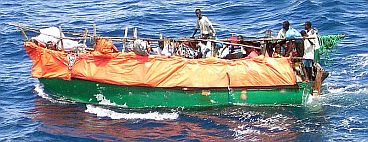Is Lampedusa really in Europe?
Is Lampedusa really in Europe?
Today thirty more bodies were buried, making a total of 140 that have lost their lives because they had begun their journey to the Italian island of Lampedusa in an overcrowded boat. The member states and most Members of the European Parliament have sat back and allowed an ugly situation to develop and persist. They evidently find the existing asylum system excellent. On Tuesday the European Union Council of Ministers for Foreign Affairs meets to discuss the matter. Hopefully they will go beyond expressing their sorrow about the accident. Structural solutions are needed and this won’t wait a single day longer.

It is of course an extremely complex problem. Too many people want to come to Europe from Africa and it’s now almost impossible to admit Africans who want to leave for reasons which are purely economic. At the same time we are bound by both the UN Convention Relating to the Status of Refugees and simple reasons of morality to offer our protection to the refugees amongst them. And we must prevent catastrophes such as this. We can’t turn a blind eye when just beyond the Italian coast, day in, day out, ramshackle boats are crossing the sea and people are daily suffering accidents. This too is a moral duty.
So the Foreign Ministers have a great deal to discuss. Better surveillance at sea, aimed at preventing further accidents, it seems to me should be the first requirement. Via EU border management agency FRONTEX the member states are already cooperating intensively, but too great a priority is given to preventing unauthorised immigration and too little on extending humanitarian support. Yet this latter task has been from its beginnings a part of FRONTEX’s mandate. Intensive patrols and clear instructions on how to treat those on board intercepted boats must be quickly established.
That is, however, far from sufficient. The reception capacity on Lampedusa is completely inadequate. The refugee camp there is, as things stand, bursting at the seams. So the ministers must also consider this issue. Italy could be doing more, but a common asylum policy should also mean a common responsibility. I have long advocated the establishment of European asylum centres, where asylum seekers could be received and decently housed until they are told, with all due speed, whether they will be allowed to apply for recognition as refugees. My initiative was widely welcomed by members of the Dutch government, including Secretary of State for Asylum Fred Teeven, but to date I still haven’t heard any move from the Netherlands to put this into practice. In the European Parliament too people are tired of dealing with the entire package of proposals on asylum, which will change nothing in the fundamental rules and contains no provisions for, for example, a feasibility study on European reception centres. I propose, in addition, that we in the European Parliament organise, as quickly as possible, a hearing on this theme and that following this we put pressure on the Commission and the member states to get on with it.
Lastly, we must not forget the external dimension. North African states have not ratified the UN Refugees Convention and now many of these countries are themselves unstable, yet they too have a moral duty to offer a decent reception to people. True refugees should not be forced to cross the Mediterranean to seek protection. In this, the EU should be exerting rather more pressure.
- See also:
- Dennis de Jong
